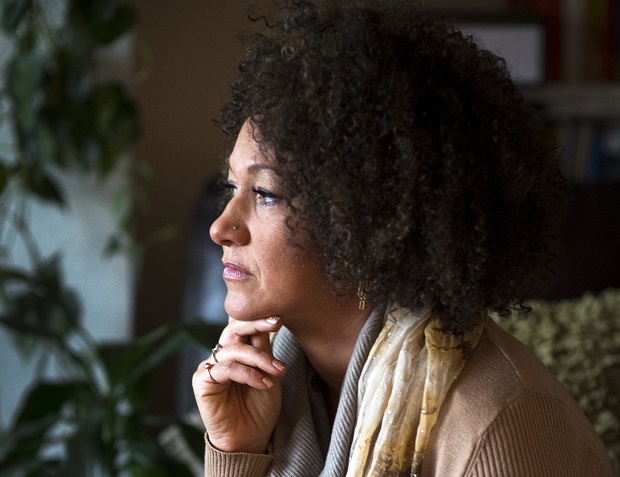
In this March 2, 2015 file photo, Rachel Dolezal, president of the Spokane chapter of the NAACP, poses for a photo in her Spokane, Washington, home. Dolezal is facing questions about whether she lied about her racial identity, with her family saying she is white but has portrayed herself as black, Friday, June 12, 2015. AP
SPOKANE, Washington, United States — The president of a chapter of a major U.S. group advocating for the rights of African Americans resigned Monday, just days after her parents said she is a white woman posing as black — a dizzyingly swift fall for an activist credited with injecting remarkable new energy into the civil rights organization.
The furor touched off fierce debate around the country over racial identity and divided the NAACP itself.
“In the eye of this current storm, I can see that a separation of family and organizational outcomes is in the best interest of the NAACP,” Rachel Dolezal, who was elected the Spokane chapter’s president last fall, wrote on the group’s Facebook page. “Please know I will never stop fighting for human rights.”
City officials, meanwhile, are investigating whether she lied about her ethnicity when she landed an appointment to Spokane’s police oversight board. On her application, she said her ethnic origins included white, black and American Indian.
Dolezal, a 37-year-old woman with a light brown complexion and dark curly hair, graduated from historically black Howard University, teaches African studies at a local university and was married to a black man. For years, she publicly described herself as black and complained repeatedly of being the victim of racial hatred in the heavily white region.
The uproar began last week after Dolezal’s parents told the news media that their daughter is white with a trace of Native American heritage. They produced photos of her as a girl with fair skin and straight blond hair.
Her mother, Ruthanne Dolezal of Troy, Montana, told reporters she has had no contact with her daughter in several years. She said Rachel began to “disguise herself” as black after her parents adopted four black children more than a decade ago.
Rachel Dolezal initially dismissed the controversy, saying it arose from a legal dispute that has divided the family, and repeatedly sidestepped questions about her race. “That question is not as easy as it seems,” she said. “There’s a lot of complexities.”
Late last week, the national NAACP stood by her, saying “one’s racial identity is not a qualifying criteria or disqualifying standard for NAACP leadership.”
But Dolezal came under increasing pressure from local chapter members to resign.
Kitara Johnson, an NAACP member in Spokane who has been calling on Dolezal to step down, welcomed the resignation as “the best thing that can happen right now.”
Johnson said she hopes Dolezal remains a member of the organization.
“She knows her stuff,” Johnson said.
Dolezal has been widely credited with reinvigorating Spokane’s moribund NAACP chapter. In resigning, she boasted that under her leadership, the chapter acquired an office, increased membership, improved finances and made other improvements.
A multicultural group of a few dozen people rallied in downtown Spokane on Monday night in support of the NAACP. All held signs saying “Integrity Matters.”
Dennis Mitchell, of Spokane, who led the rally, said, “It’s about forgiveness tonight, and we want to forge ahead.”
“It feels like the ultimate betrayal,” Angela Jones, an NAACP member from Spokane, said of Dolezal after the rally. “Why would you not be honest?”
The controversy drew conflicting views from other NAACP leaders.
“I care that she was trying to make the world a better place every day,” said Frank Hawkins Jr., the NAACP president in Las Vegas. “The color of a person’s skin does not matter.”
Don Harris, a white man who heads the NAACP in the Phoenix area, criticized her, saying: “What do you gain in saying, ‘I’m an African-American’ when you’re not?”
“The NAACP is not concerned with the racial identity of our leadership,” Cornell William Brooks, national president of the NAACP, said in a statement Monday. Dolezal “has decided to resign to ensure that the Spokane branch remains focused on fighting for civil and human rights.”
Dolezal has not returned numerous calls to her home and offices from The Associated Press.
Dolezal was fired Monday as a weekly columnist for The Pacific Northwest Inlander, Spokane’s alternative weekly, and her contract as an instructor at Eastern Washington University was not renewed.
City officials are investigating whether she lied about her ethnicity when she landed an appointment to Spokane’s police oversight board. On her application, she said her ethnic origins included white, black and American Indian.
Dolezal’s parents appeared on the “Today” show Monday and said they hope to reconcile with their daughter.
“We hope that Rachel will get the help that she needs to deal with her identity issues. Of course, we love her,” her mother said.

